“What could possibly go wrong?” Kayaking fishing is not a hobby that comes to mind when thinking of the most dangerous past times in the world, that’s for sure. Do not be fooled by its peaceful nature, kayak fishing can be deadly.
Generally, kayaking fishing is relatively safe, but there are some immediate risks that do not immediately come to mind when you’re getting ready to hit the lake (or river). These risks have a wide range and need to be considered before pushing off the river bank.
Study the environment where you will be kayak fishing
Studying the environment where you’ll be is a choice that can save you time, headache, or even a hospital trip. Try asking yourself these questions before you go somewhere new, or even before you return to your normal spot.
What kind of insects will I be dealing with?
Nothing is more annoying than a few bug bites, but when you have a couple dozen; that’s a problem. Insects like mosquitoes carry all kinds of nasty diseases, not only that but they tend to creep people out, yikes. Bug spray may be one of the most easily forgotten essentials for kayakers. Good news, we live in a time where most of us are just a skip away from a store that carries bug spray. As for premium or off-brand, that’s for you to decide.
Are there any dangerous animals in the area? (Think snakes, sharks, beavers, alligators…)
Snakes, sharks, and gators, oh my! The bad news here is that there isn’t really a shark repellent, other than beating it with your paddle, of course, so we must arm ourselves with knowledge on how to avoid, and in worst case scenario; to defend ourselves against these creatures. Personally, I have seen dangerous wildlife crawl into kayaks of unexpected fisherman. The reaction is always funny, but that’s if no one gets hurt. Learn to deal with these fearless warriors and don’t let a good memory turn sour. Remember, at the end of the day the wild belongs to the creatures that live there, oh, and your paddle makes a decent weapon.
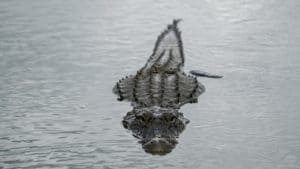
Will there be any large boats there? (Boats tend to create waves which can, and will, capsize you)
Large lakes or open bodies of water tend to attract boaters. Generally speaking, boaters are not directly worried about your ability to hand the waves their vessel creates. It is paramount that you learn how to handle waves (not just boat waves, but ocean waves as well) otherwise, you will be swimming and your gear will more than likely be sinking. When you start kayak fishing it is more important to get used to your kayak and learn how it handles, each one is different; so hit a small lake until you’re ready to move up.
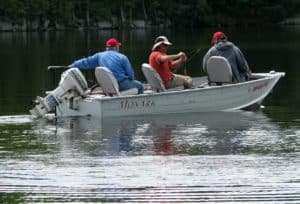
Will I have to go through rapids or around rocks? (This is mostly for river kayaking and is very hazardous)
oh boy, nothing gets my blood pumping like unexpected rapids. Rather, you neglect to study the river you’re fishing or you take a wrong turn; rough rapids are terrifying. Small rapids are manageable and downright fun if you are experienced. However, if you are inexperienced with kayaking, even small rapids can be disastrous. These patches of swift water can dump you out of your kayak or put you up against a rock. Despite some kayaks having scupper holes (drain holes), they still sink. Be sure to always wear your PFD (personal flotation device) and make sure it fits properly. Stay away from rapids altogether when you start kayak fishing and ease into slow rapids as you grow in ability.
Check the weather
This one may be a little obvious, but you would be surprised how many weather-related injuries happen to kayakers every year. It is important to check the weather but to know exactly what it means to you. I cannot stress enough how important this is to do each and every day, especially before you go out kayak fishing. Here are some things you will want to know before you try to hook that monster bass.
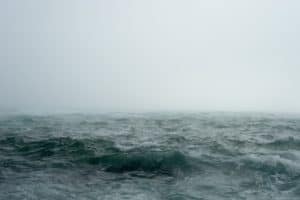
What’s the temperature? (Is it hot? Cold?)
It goes without saying that you won’t be wearing your favorite sweatshirt during a record-breaking week in the heat of summer. Heatstroke is a very real danger for kayak fisherman, a nice cool breeze can often help you forget how hot it actually is. Bring plenty of water and stay adequately hydrated, and wear proper summer clothing. There are many lightweight, thin, clothing options for kayakers to help keep cool in the summer. On the opposite end of the spectrum, hypothermia and trench foot are also extremely unforgiving. If you plan on kayak fishing any other time than summer, be sure to wear clothing that will dry quickly while keeping you insulated. If you value your toes, be sure to keep them dry; if you choose to invest in waterproof boots and insulated socks, they do help. There are many clothing options for kayak fisherman for each type of weather, but they are optional.
What else can happen?
I’m glad you asked that. I have a few more things you should be aware of to make sure you are the most prepared you can possibly be to start kayak fishing! While these hazards aren’t quite as common, they are still very much real.
Flipping your kayak
It’s not a matter of if it will happen, it’s when. Experts, as well as noobs, flip their kayaks, it just happens. Get comfortable with the thought of flipping and always wear your PFD (personal flotation device). Make sure that you’re tying down all of your equipment, and do not bring anything you are unprepared to lose. Learn how to flip your kayak back onto its bottom while in the water and practice it. Getting comfortable with being in the water and learning to flip your kayak can save you a lot of headache, but can also save your life. Depending on the wildlife or the weather, getting back into your kayak in a timely manner may save you from injury. The main thing is to stay calm and know exactly what to do and how to do it. Practice! Practice! Practice!
Getting lost/ missing your stop
This becomes a danger when in a river or the ocean. It’s easy to get distracted when hooking the big one or just enjoying the scenery, and that can mean getting hopelessly lost or missing your stop on the river. When river kayaking, you put in upstream and get out at a set point. More than likely that’s where your ‘kayak fishing buddy’ has their vehicle parked downstream so you can load your kayaks and haul back to your vehicle, or at least hitch a ride. So it is very important that you make your stop when traveling down the river if you miss your stop it can waste a good amount of time or push you into something you’re trying to avoid (like rough waters ahead). In the ocean, waves have a tendency to turn you around and currents will pull you. Keeping your bearing is important in finding your way back to shore. The last thing you want to do is head farther into the ocean because you think land is that way. It always pays to bring a compass so you can be assured you’re heading towards land. Landing on a beach you’ve never heard of thirty miles down the coast is also very easy to do. Pick easily recognizable landmarks to help guide you back to exactly where you want to be. Before you hit the water, take a few minutes to sit and think about what you will do if you get lost or miss your stop.
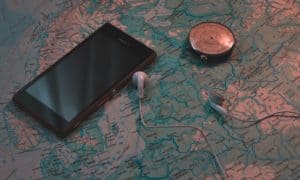
Equipment failure
Remember earlier when I mentioned using your paddle as a weapon? While that is an option, it is not a paddles intended purpose (which may cause it to break). Not only can using your paddle for a weapon break it, so can other things. Be prepared for the imminent equipment failure you will experience at some point or another. More commonly, the gear problems you run into will be small and manageable, such as a broken rod. The best way to combat random misfortunes is to bring some spare equipment. Now you’re not going to want to pack an extra paddle or fish net so pick you up some water-proof tape.
Physical exertion
Physical exertion may very well be the most underrated kayak fishing danger. It is important to know your personal limits if you’ve never been kayak fishing it is important to learn what it takes to do it. It sounds extremely lax, and for the most part, it is. However, when you take into account the weather and other variables such as dehydration or improper diet; the situation may change. When you’re new to kayak fishing, there can be a lot of strain on the upper back and shoulders due to paddling and fishing related tasks. Start small and make sure you’re comfortable with kayaking and gradually work your way up.
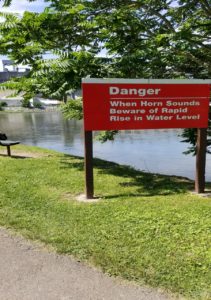
In closing…
While the dangers listed above are dependent on mother nature or rely on chance, they do happen. Being aware of what can go wrong is key in any hobby. Preparedness is the only protection you have from the unknown, make sure that you take into account as much as you possibly can when planning each trip to the water. That being said: kayak fishing is tremendously fun and is a life-changing hobby. From the first time you get into the water and cast your line, it will change not only the way you fish but the way you live. This is truly a great hobby that we have. The rewards of kayak fishing far outweigh the risks, and therefore it is simply a must try hobby. Get out there and try it!

